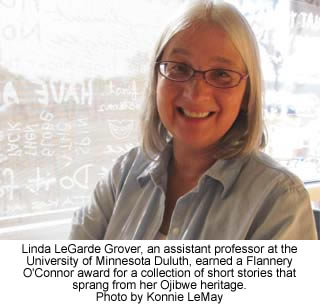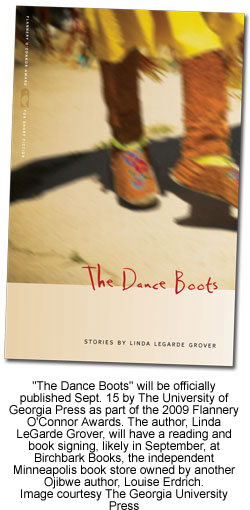 |
Canku Ota
|
 |
|
(Many Paths)
|
||
|
An Online Newsletter
Celebrating Native America
|
||
|
September 1, 2010 -
Volume 8 Number 9
|
||
|
|
||
|
Professor Earns Flannery
O'Connor Award For Book
|
||
|
by Konnie LeMay, Indian
Country Today correspondent
|
||
|
Two steps forward, two back, a turn here or there and the tales weave rhythmically back and forth between the reservation, nearby cities and boarding schools, between eras from the turn of the 20th century into the 21st and between families, lovers and friends. This collection of stories earned Grover one of two 2009 Flannery O'Connor Awards for Short Fiction from the University of Georgia Press. Since 1983, the awards have included a cash prize and publication of a short story collection. Grover's "The Dance Boots" will be published Sept. 15. Grover is a member of the Bois Forte Band of Chippewa in Minnesota and is an assistant professor of American Indian studies at the University of Minnesota Duluth. "These stories are genuine and sincere. (The collection) wasn't academic, it wasn't cloy. … It was funny and these people's lives are important," Nancy Zafris, editor for the Flannery O'Connor Award series, said of Grover's work. "All of her cultural and linguistic details. … broaden the stories. The stories seem universal to me." The Flannery O'Connor Awards, established in the 1960s in honor of the famed novelist and short story writer who died in 1964, attracts as many as 300 manuscripts each year. The other 2009 winner was Jessica Treadway from upstate New York and her manuscript “Please Come Back to Me."
“I remember that very well. Some of my relatives could speak the language, joking in Ojibwe. … That's just the way I was used to hearing conversations." While the characters and the reservation are fictional, all are based on experience for Grover. The title story of “The Dance Boots" does harken to Grover's family. Her grandmother, who died before she was born, was a traditional dancer and Grover also did get boots for her own dancing from her aunty, just as in the story. Two fictional boarding schools play prominently in these stories, but a real boarding school, the former Vermillion Lake Indian School near Tower, Minn., was where her grandparents met. Grover has done an article for the Minnesota Historical Society on that school and used some of that information for her fiction. In fact, true stories about boarding school experiences eventually led Grover to try fiction. Her doctoral dissertation involved gathering histories from Ojibwe elders about their time at such schools. On completing her project, she felt comfortable presenting the information to members of her review committee, such as Thomas Peacock of the Fond du Lac Band of Lake Superior Chippewa and the associate dean of the UMD College of Education and Human Service Professions. But she felt the stories were too personal to share with a broader audience and so did not seek publication of her dissertation, as might be expected. “I didn't feel like exposing our stories in that way." Peacock, himself an author of several award-winning non-fiction books, suggested that Grover try to use what she had learned in fiction. Skeptical of fiction for herself, she tried it. “I could see that it was just terrible," she recalled of her first attempt, “but then I tried it again and found I liked it." Grover
has since written many short pieces and poetry, including an unpublished
collection called “The Road Back to Sweetgrass" that uses many
of the same characters or relations of characters in “The Dance
Boots." She also has done a “chapbook," “The.Indian.at.Indian.School,"
as part of the Native Writers Chapbook Series. It is in book form
and can be found online at anpa.ualr.edu/digital_library/indatindschool.html.
"They're fiction and that makes all the difference in the world." However, Grover feels a loyalty to these fictional characters. "I like these people. They're fiction, I know. … but I try to treat them with courtesy and discretion; that is proper Ojibwe manners." Grover also tries to introduce the cultural mores of her Ojibwe heritage into her teaching methods. Many of her class assignments are cooperative projects, where students depend on – and help – each other. "Everybody was created for a purpose much larger than yourself. That is the trust that was given to each generation." For Grover, fictional storytelling to record important parts of her heritage may be that purpose. "It is really one of the gifts that I've been given in life. It's a tremendous privilege, a tremendous gift." |
|
|
|
||
|
|
||
| Canku Ota is a free Newsletter celebrating Native America, its traditions and accomplishments . We do not provide subscriber or visitor names to anyone. Some articles presented in Canku Ota may contain copyright material. We have received appropriate permissions for republishing any articles. Material appearing here is distributed without profit or monetary gain to those who have expressed an interest. This is in accordance with Title 17 U.S.C. Section 107. | ||
|
Canku Ota is a copyright ©
2000, 2001, 2002, 2003, 2004, 2005, 2006, 2007, 2008, 2009, 2010
of Vicki Barry and Paul Barry.
|
||
 |
 |
|
|
The "Canku
Ota - A Newsletter Celebrating Native America" web site and
its design is the
|
||
|
Copyright ©
1999, 2000, 2001, 2002, 2003, 2004, 2005,
2006, 2007, 2008, 2009, 2010
of Paul C. Barry.
|
||
|
All Rights Reserved.
|
||
 DULUTH,
Minn. – Life is something of a dance for families on the mythical
Mozhay Point Indian Reservation in Minnesota, created in Linda LeGarde
Grover's short-story collection, "The Dance Boots."
DULUTH,
Minn. – Life is something of a dance for families on the mythical
Mozhay Point Indian Reservation in Minnesota, created in Linda LeGarde
Grover's short-story collection, "The Dance Boots."  In
“The Dance Boots," many of the characters two-step between
languages, mingling Ojibwe with English; this dance of language
comes from Grover's childhood.
In
“The Dance Boots," many of the characters two-step between
languages, mingling Ojibwe with English; this dance of language
comes from Grover's childhood.